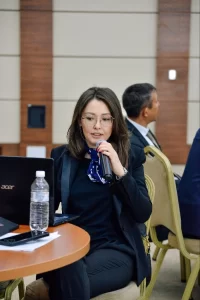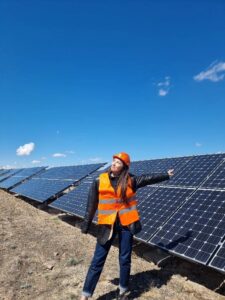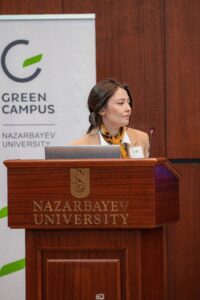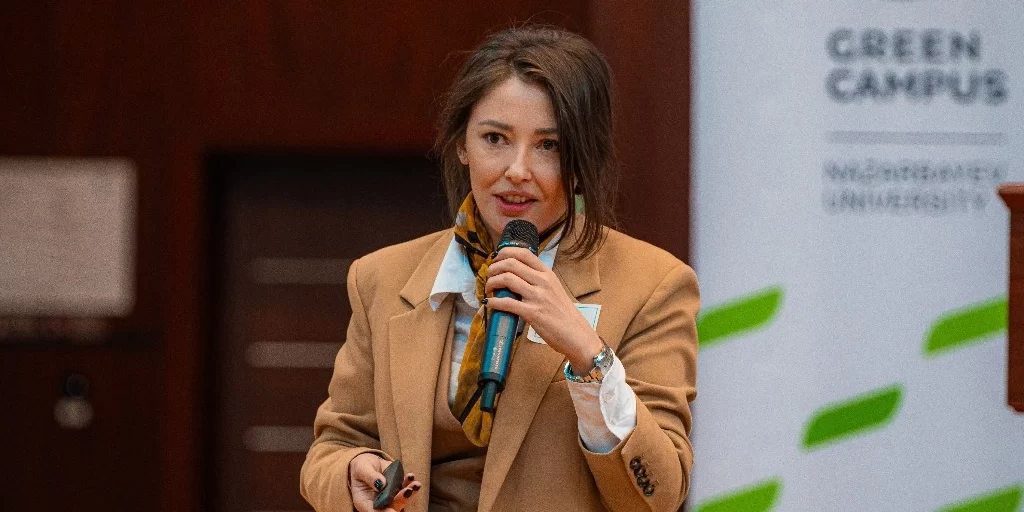What inspired you to transition from the IT industry to the field of renewable energy and the green economy?
My career journey has been diverse and interconnected, though many assume I have an IT background. In reality, my foundation lies in agriculture, where I earned a degree as a Technologist of Meal. This four-year program provided me with in-depth knowledge of food standards, hazard analysis, and critical control points, equipping me for roles in organizations like the FAO.
Subsequently, I expanded my expertise by studying hotel and tourism management, in various countries abroad. Over time, my professional trajectory evolved seamlessly, connecting fields such as food, tourism, IT, and climate change. Each step has been part of a natural progression, culminating in my current focus on the renewable energy sector, where I integrate insights from these diverse areas to drive impactful solutions
Can you share what it means to be a fellow in the Central Asia Energy Program and what you hope to achieve during this year?
First of all, I am thankful, that this program provided the knowledge I needed. I was content that I had a very experienced Mentor. To be a Fellow is a brilliant privilege and responsibility. When you represent your country, when you have certain followers who believes into what you do. It means dedication and discipline. It was challenging, but rewarding. I have chosen a research topic on energy sharing and energy communities.
Your research topic focuses on energy communities. Can you explain what energy communities are and why they are important?
Thank you for that question, energy communities are groups of individuals, businesses, or organizations that come together to produce, manage, share, or distribute energy locally, often with a focus on renewable energy. For example, Solar roof tops installed at single or multifamily residential building apartments. It can be off grid or on grid.
Why it is important? Reducing electricity bills and promoting renewable energy are crucial for improving people’s quality of life and supporting sustainability. In Kazakhstan, where housing is the second-largest energy consumer, small-scale renewables can empower communities and help achieve national energy goals.

What is green taxonomy, and how does it impact renewable energy policy in Kazakhstan?
Green Taxonomy is a classification system that identifies economic activities considered environmentally sustainable. Its primary purpose is to guide investments by providing clear criteria for what qualifies as “green” or sustainable.
In Kazakhstan, we have Environmental Code, and Taxonomy defined as a classification system for categories of “green” projects eligible for financing through green bonds and green loans.
Renewable energy policy is multifaceted, encompassing the regulatory framework, auction mechanisms, I-RECs, green bonds, investment agreements, and more. Green finance is an integral part of this policy, significantly influencing its development. However, taxonomy serves as a tool within green finance, promoting transparency and trust in green capital markets.
What skills do you find most valuable in project coordination, especially in the context of renewable energy projects?
One of the most valuable skills in project coordination is effective task management and delegation. For instance, writing down clear tasks and maintaining to-do lists for each team member ensures transparency and accountability. This approach allows the team leader to track progress, identify gaps, and ensure that ongoing work aligns with project timelines and objectives.
In the context of renewable energy projects, this skill is particularly critical due to the complexity and interdisciplinary nature of the field. Coordination requires aligning technical, financial, and regulatory aspects while keeping all stakeholders informed. Additionally, strong communication, problem-solving, and adaptability are essential to manage unexpected challenges and maintain momentum toward achieving sustainability goals.
How do you ensure customer satisfaction in your projects, particularly in the renewable energy sector?
Well customer satisfaction in general is about retention and client needs. But for renewables it’s not only about customer needs, it’s their goals and concerns. Effective Communication from the start till the end of the project. That is how you can ensure client needs.

How important is collaboration with other organizations and stakeholders in your work, and can you provide an example?
Based on my diverse experience, effective collaboration is essential for any project. To meet client needs, it’s crucial to communicate with stakeholders; without this, achieving project milestones becomes nearly impossible. Collaboration is not just about completing tasks but also about building lasting partnerships. For example, in research projects, especially with qualitative methodologies, collaboration is equally vital. It often involves conducting interviews with stakeholders to gather insights and ensure the research is comprehensive and impactful.
In your opinion, what are the most pressing climate issues facing Kazakhstan today?
It is a lot, glacier melting, water resources, land degradation, extreme weather events, air pollution, and last, which is more complex (in my point of view) is the energy transition. Kazakhstan has fossil fuel and coal economy, and transitioning its energy economy into greener is challenging.

What advice would you give to university students who are interested in pursuing a career in renewable energy or environmental policy?
Be proactive and take advantage of opportunities during your studies:
- Follow renewable energy and environmental organizations on social media.
- Stay updated by reading news and industry developments.
- Attend conferences, even as a listener, to learn and connect.
- Build your network by engaging with professionals and peers.
Once you’re part of the community, identify opportunities aligned with your interests – such as internships, as I highlighted in the presentation.
But the crucial advice is – Internship. A fresh graduate should pursue an internship as it provides invaluable experience and helps identify areas of interest for future career paths. Internships are crucial for gaining practical insights and building a strong foundation for professional growth.
What trends do you see shaping the future of renewable energy in Central Asia?
Once Central Asian countries reach their renewable energy capacity targets, the focus will naturally shift from expansion to optimization and integration. Energy trading and energy communities will emerge as key trends, enabling decentralized energy sharing and balancing supply and demand.
The housing sector will become a priority through retrofit programs, incorporating renewable energy systems and battery energy storage (BESS) for efficiency and self-sufficiency.
How has your education in strategic management of renewable energy influenced your career choices?
Pursuing a master’s program in 2021 boosted my career in research. Although finding a job remains challenging, I continue to contribute as a consultant on short-term projects.
How has your background and experience in different countries shaped your perspective on renewable energy?
My career started 14 years ago, where I gained experience in bilateral and multilateral cooperation, in the food and agriculture sector, IT sector, focusing on business development and project management. Green technologies and green finance in climate change. It is very diverse background, I now focus on incentive measures and analyze international experiences in renewable energy policies and financial instruments.
What strategies do you recommend for building a professional network in the renewable energy sector?
Use every opportunity to get involved – join working groups on energy or the environment, attend conferences, forums, and workshops. If you’re in the scientific field, constantly present your publication research papers. For those interested in management, demonstrate your interest by analyzing reports and sharing insights on platforms like LinkedIn. You may read a report from international companies, and write a short post about it.
How do you continue to develop your skills and knowledge in such a rapidly evolving field?
I stay updated by participating in workshops, following news and trends. My focus spans not just renewable energy, but also climate change, green finance, and energy sectors
Can you share a success story from your work that highlights the impact of renewable energy initiatives in Kazakhstan?
It’s difficult to pinpoint one success, but I have one, being the Fellow of the Central Asia Energy Fellowship program stands out. The impact I’m most proud of is raising awareness about renewable energy, which marks the start of my contributions to the energy sector.
How do you manage work-life balance while pursuing a demanding career in renewable energy?
Managing work-life balance is challenging, but I maintain discipline by sticking to a schedule and to-do list. Once my tasks are completed, I can focus on activities outside of work
Have you had mentors who influenced your career? How did they help you grow professionally?
I’ve had several mentors, each providing knowledge and guidance. The key to benefiting from a mentor is to listen, ask questions if something is unclear, and analyze their advice. The impact on professional growth becomes visible after years of learning and working with mentors.
Outside of work, what hobbies or activities do you enjoy that help you recharge?
I enjoy writing scripts, visiting museums, and traveling. Spending time with friends and family also helps me recharge.
If you could share one key piece of advice for young professionals just starting out in their careers, what would it be?
I have actually two, #1- before applying for a job, make sure your competencies align with the listed requirements. Otherwise, you’ll waste both your time and the company’s. #2 -I recommend starting with an internship in the field you’re interested in – it’s the best way to determine if it’s the right career path.







